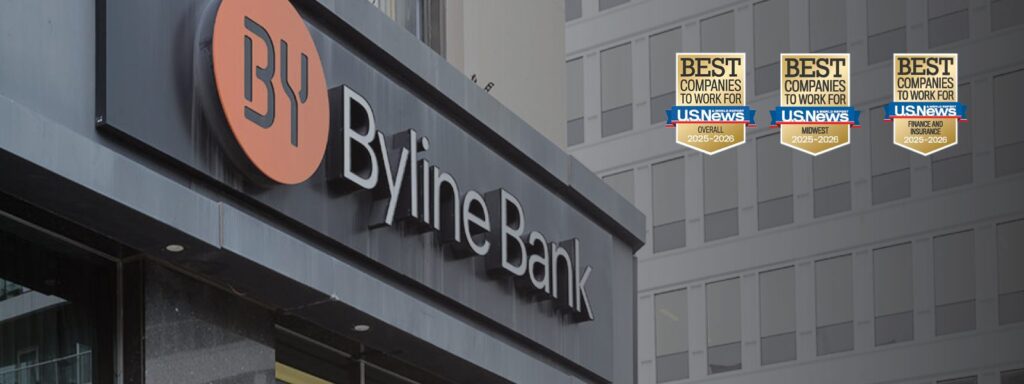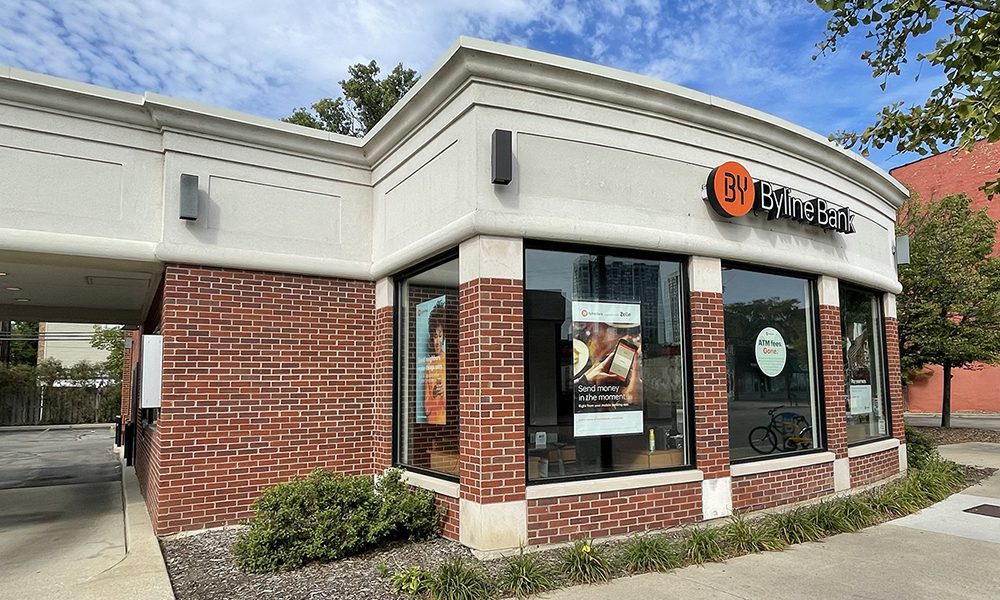Take the first step toward your financial goals with personalized support from Byline Bank.
Build Your Minority-Owned Business

Tackling the Disparities in Access to Capital
Small businesses are the heart of our local communities and the backbone of the United States economy, accounting for anywhere between 43.5% and 50.7% of the U.S. gross domestic output (GDP) and trillions of dollars of economic activity. However, minority-owned small businesses make up a disproportionally smaller percentage of these businesses – and it’s not a lack of desire, vision or effort. According to a report on disparities in capital access between minority and non-minority-owned businesses from the U.S. Department of Commerce Minority Business Development Agency, many would-be minority entrepreneurs face systemic barriers in accessing financing. This disparity limits the establishment, expansion and growth of small businesses with the potential to make a significant economic impact on the communities they serve.
Recent data from Federal Reserve System found that racial biases continue to impact loan approval rates for minority business owners, leading to a pronounced disparity in access to capital. While 56% of White financing applicants were able to obtain the capital they applied for, just 32% of both Hispanic and Black applicants and 34% of Asian applicants reported being able to secure financing for their businesses. Lest you think this disparity only has to do with systemic challenges and credit-worthiness, data from a recent study from The Journal of Marketing Research “Revealing and Mitigating Racial Bias and Discrimination in Financial Services” revealed that even with stronger financial profiles than White business owners, Black business owners have a harder time securing financing.
Byline Bank is committed to addressing equitable access to capital. Our local business banking team understands the needs of diverse small businesses in Chicagoland, and Byline’s national SBA lending team can help minority-owned businesses across the country find customized financing solutions that meet their needs, whether they’re growing a business, buying an existing business or just starting out. In total, Byline has funded millions of dollars in financing to help ambitious business owners pursue their dreams.
Understanding the Hurdles to Find Solutions
While there are a variety of factors contributing to the challenges minority owned business owners face when accessing capital, we can’t underestimate structural, systemic inequities. According to data from the Pew Research Center, a notable wealth gap remains between White households and Black and Hispanic households across the country. Between 2019 and 2021, the wealth gap between White and Black/Hispanic households continued to increase. In 2019, the typical White household had $168,800 more in wealth than the typical Hispanic household, and in 2021, this gap increased to $201,700.
This economic disparity translates into lower credit scores and less collateral, which are critical factors in securing business loans. Without easy access to funding, African American and Latinx business owners are more likely to use personal and family savings, credit cards, and other sources of capital to start their businesses compared to all business owners, according to a report from the Milken Institute.
Additionally, minority business owners are less likely to have established relationships with traditional banking institutions, which can further impede their ability to obtain financing. This lack of connection to financial networks often results in higher loan denial rates and less favorable loan terms for minorities.
Building Pathways to Progress and Prosperity
Addressing the disparities in access to capital for minority-owned businesses requires targeted policies and practices designed to eliminate these financial hurdles. One effective approach is to implement Diversity, Equity, and Inclusion (DEI) initiatives within financial institutions. Byline Bank has adopted comprehensive DEI policies that aim to create more equitable lending practices. These policies include setting specific goals for lending to minority-owned businesses, offering financial education programs tailored to minority entrepreneurs, and building partnerships with community organizations that support minority businesses.
Financial institutions can also establish dedicated loan programs for minority-owned businesses, providing lower interest rates and more flexible repayment terms. Additionally, offering technical assistance and mentorship programs can help minority entrepreneurs build their credit profiles and develop robust business plans, making them more attractive candidates for traditional financing.
To measure the effectiveness of these initiatives, financial institutions should track and report on the number of loans secured by minority-owned businesses to benchmark against industry averages. This transparency not only holds institutions accountable but also demonstrates a tangible commitment to supporting minority entrepreneurs.
The Transformational Spirit of Minority-Owned Small Businesses
Byline Bank’s commitment to supporting minority-owned businesses is exemplified through success stories like Chicago-based minority-owned small businesses, Jus Studios and MidTown Hardware.
After founding Jus Studios, a creative streetwear apparel studio, as a DIY basement project, Jorge Gonzalez realized he was ready to scale. Seizing every opportunity to learn the intricacies of screen printing and embroidery, the young entrepreneur in his early 20s quickly built his name by interning at local print shops and collaborating with graffiti artists, clothing designers, until hitting his breakout moment: embroidering Chance the Rapper’s first iconic “3” hat.
As his business started to take off, obtaining the financing to scale his equipment and production space became a challenge due to his nascent credit history that required creative solutions from a dedicated partner. Byline Bank stepped in, offering a tailored line of credit package that included financial advisory services and flexible repayment options, enabling Jus Studios to purchase a brand-new automatic screen-printing machine, expand its operations into a 5,000-square-foot space in East Pilsen, hire additional staff, and increase its market presence. Beyond obtaining the necessary capital, Byline has remained a committed partner in the sustained growth of his business and offering continuous support to help the business thrive.
Similarly, when Charles Nkuku realized he wanted to purchase Lehman Midtown True Value Hardware, a place he had been working at shortly after graduating from college, he struggled with obtaining a loan from traditional banks due to a lack of established credit. With the help of Byline, Nkuku is still the proud owner 35 years later. Byline Bank provided the necessary funding to renovate its storefront and diversify its product offerings, which was instrumental in helping MidTown True Value Hardware achieve sustained growth and community impact.
Becoming a Changemaker
Ensuring equitable access to capital for minority-owned businesses is not only a matter of economic justice but also a crucial driver of broader economic growth. By adopting inclusive lending practices and providing targeted support, financial institutions can play a pivotal role in bridging the capital gap that minority entrepreneurs face. Byline Bank’s success stories with Jus Studios and MidTown True Value Hardware highlight the tangible benefits of such initiatives, proving that when given the opportunity, minority-owned businesses can thrive and contribute significantly to the economy. As we move forward, it is imperative that more financial institutions follow suit, fostering an inclusive financial ecosystem that supports and uplifts all entrepreneurs.




